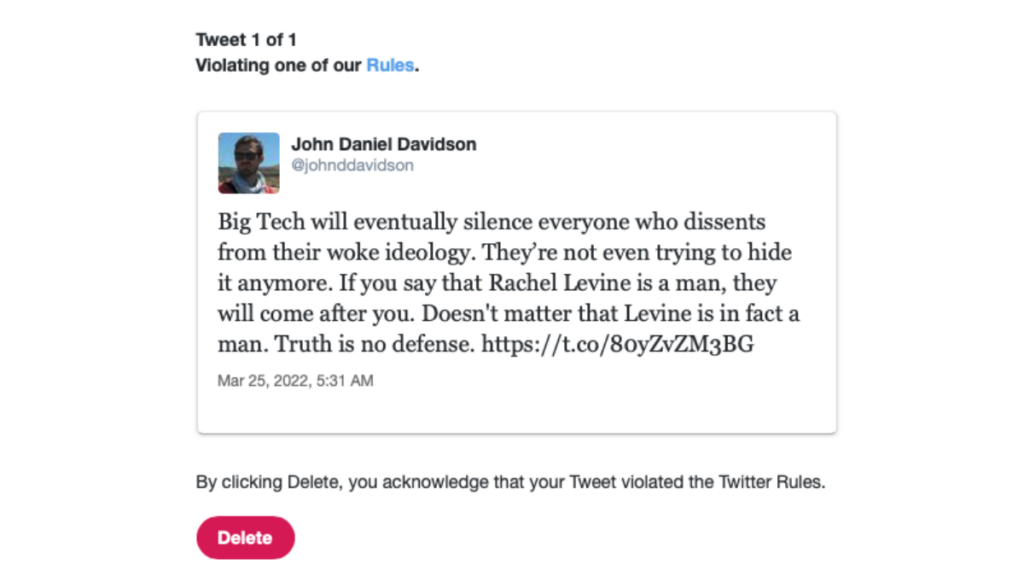Elon Musk Agrees With The Federalist’s John Davidson On The Dangers Of Big Tech Censorship, But Won’t Unban Him On Twitter
Last Friday, Elon Musk agreed with Federalist Senior Editor John Daniel Davidson that social media content moderation is often sinister and provides the federal government with an avenue to illegally and secretly censor people. The irony is that Davidson is currently banned on Musk-owned Twitter for an ideological thought crime, and Musk has made no move to reinstate Davidson, despite Musk’s bold “free speech” brand campaign.
Stanford University professor, physician, epidemiologist, and health economist Dr. Jay Bhattacharya shared an article written by Davidson on Twitter with a quote from Davidson’s piece: “The entire concept of ‘content moderation’ is a euphemism for censorship by social media companies that falsely claim to be neutral and unbiased … They provide cover for a policy of pervasive government censorship.”
Musk responded to the Tweet, agreeing with Davidson’s statement and writing, “There is harmful content moderation too, but yes.” Bhattacharya answered back to Musk, “Yes, content moderation to remove violent threats, child porn, etc. is good. Government induced viewpoint discrimination on scientific and policy matters not so much.”
Davidson remains banned since last March, and his suspension has nothing to do with the “harmful content” that Musk mentioned. There were no “violent threats” nor “child porn” involved. Davidson was banned for stating the biological fact that Rachel Levine, the Biden Administration’s transgender assistant secretary for health, is a man.

Davidson was told by pre-Musk-owned Twitter that his truthful Tweet amounts to “hateful conduct” and was given the option to either remain banned or delete the tweet, whereby he would acknowledge that he “violated the Twitter rules.” In other words, he would only be allowed back on Twitter if he showed contrition to the tech giant by self-admitting he had been hateful.
[READ: Twitter Locked My Account For Telling The Truth About Rachel Levine]
Of course, Davidson refused to participate in Twitter’s re-education exercise, which is why he remains banned to this day—even under Musk’s supposed “free speech absolutist” platform. The Federalist’s Editor-in-Chief, Mollie Hemingway, and CEO and Co-founder Sean Davis pointed out the irony in Musk maintaining the ban on Davidson yet agreeing with him on the dangers of Big Tech censorship. So far, Musk has not responded to any of the numerous appeals that he unban Davidson.
Interestingly, The Babylon Bee was also banned for stating Levine is a man around the same time as Davidson. However, The Bee was reinstated almost immediately after Musk took over, along with a whole swath of high-profile Twitter exiles, including Jordan Peterson, Donald Trump, Kathy Griffin, Project Veritas, and Rep. Marjorie Taylor Greene.
Musk’s refusal to reverse the tyrannical punishment levied on users who don’t have millions of followers, like Davidson and others, dampens Twitter’s “free speech” rebrand and makes one wonder if Musk’s selective reinstatements were nothing more than a publicity stunt.
Further evidence that Twitter is not living up to Musk’s free speech promise is the platform’s continued use of shadowbanning. Shadowbanning or “blacklisting” is when a tech company diminishes the reach of certain tweets or entire accounts without notifying the user. Shadowbanning was heavily covered in the Twitter Files, and victims of it before Musk took over included prominent conservatives like Dan Bongino and Charlie Kirk, as well as Bhattacharya.
Instead of disavowing shadowbanning, Musk has embraced it. In November, Musk wrote “freedom of speech” does not include “freedom of reach,” and “Negative/hate tweets will be max deboosted & demonetized,” meaning users “won’t find the [offending] tweet unless [they] specifically seek it out.”
Given the purposely covert nature of shadowbanning, it’s unclear who exactly is being punished with secret censorship, but we do know that, similar to John’s outright suspension, many users retain shadowbans from before Musk’s takeover.
One example is The Federalist’s Sean Davis, who has been heavily blacklisted since January 2021. If you follow Davis and search for him, his account appears. But if you do not follow him, his account will not show up in search results, even if you type in his username word-for-word. Like with Davidson’s ban, there’s no indication from Musk if or when the shadowban on Davis’ account will be lifted.
In the article that Bhattacharya shared, Davidson goes into great detail, explaining all of Twitter’s transgressions against The First Amendment revealed in The Twitter Files, from “Twitter’s involvement in a Pentagon overseas psy-op campaign” to “its silencing of dissent from the official Covid narrative,” and more.
Davidson does not just want the Twitter Files to simply concern people, he wants it to be motivating. “This should not just disturb us, it should also prod us to action in defense of the First Amendment, free and fair elections, and indeed our country,” he writes.
More than perhaps any other person in the United States, Elon Musk has that opportunity. He has the ability to fully rectify the unconstitutional crimes of his predecessors and set an example for other platforms on how to run an authentically “free speech absolutist” tech company. As for the rest of us, it’s our job to pressure Musk to live up to his promise.
Evita Duffy-Alfonso is a staff writer to The Federalist and the co-founder of the Chicago Thinker. She loves the Midwest, lumberjack sports, writing, and her family. Follow her on Twitter at @evitaduffy_1 or contact her at evita@thefederalist.com.





Comments are closed.